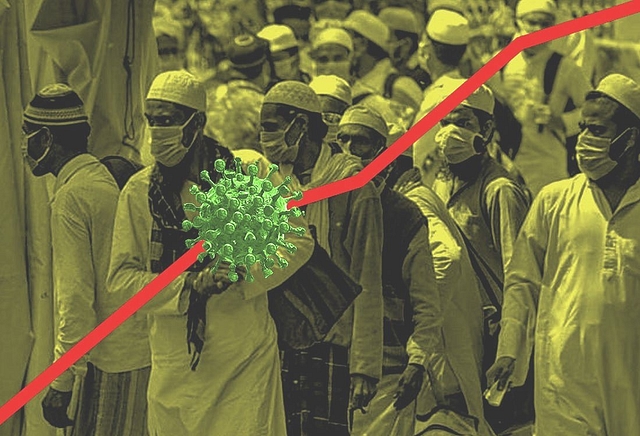
It’s Time To Take A Call On Lockdown Exit; Political Correctness Shouldn’t Stop Modi From Choosing The Right Strategy
The whole of India knows that the spike in Coronavirus cases is on account of a vector called Tablighi Jamaat.
If we have to bounce back, decisive action will have to be taken irrespective of political criticism from predictable quarters.
The fortunes of a land cannot be held hostage to self-serving ideologies.
India is currently at a crucial juncture in her fight against the Wuhan virus. A number of important decisions stand to be taken soon by the Central government.
Though we are into a fifth week of lockdown, the number of cases from selected, primarily-urban hotspots continues to rise.
The situation is grim. At the same time, the lockdown cannot be extended indefinitely since the financial brunt of such a move would be unimaginably high.
The problem for the Modi government then, in a nutshell, is how to exit the lockdown while ensuring that the epidemic does not spread.
In this piece, we describe the political constraints faced by them and why it would be in the greater national interest if the government took the necessary, tough decisions – irrespective of the political backlash which would undoubtedly follow.
These include plugging data gaps in states, pinning down vectors, firmly defining zones, and ruthlessly tightening containment protocols in and around hotspots.
Only then might a graduated exit from the lockdown be successfully instituted.
This is an important aspect, because as much as it may be denied to oneself, there is no escaping the fact that various quarters have unfortunately sought to lace the ongoing crisis with counterproductive, political flavorings.
But we have also reached a stage where, such detrimental efforts notwithstanding, Modi will have to take a call, and issue stringent directives of a plainly administrative nature, while ignoring their ramifications in certain political circles.
For that to happen, and for health risks to the general public to recede, a spade will have to be called a spade, and the laxity of some states will have to be tackled.
Thus, at some point soon, the political will have to be divorced from the administrative.
Bluntly put, the time for political correctness is long over. India has to understand and accept without demur, that an epidemic in the process of being controlled was abruptly blindsided by the Tablighi Jamaat exodus from the Nizamuddin Markaz in Delhi.
This has resulted in multiple new clusters developing in most large states of the country, primarily in those urban pockets to where the Markaz attendees retreated.
That is why many of the numbers coming out of Indore, for example, are centered round the postal district of Silawat Pura; why Ajmer has reported 79 new cases in just the past 24 hours; why the old, walled city of Ahmedabad, on the left bank of the Sabarmati, accounts for a bulk of the cases in that city; why the virus stayed benign in West Bengal until a series of investigative press reports forced that state government’s hand, into reluctantly releasing somewhat more representative numbers; or why 526 of 970 cases in Telangana – or over 50 per cent - as on 24 April, are reported from Hyderabad.
As a result, an exit from the lockdown would mean enhanced containment protocols being continued within these selected pockets.
Now, while this is not Islamophobia, but data, there would still be a tumultuous furore from the usual corners over ‘selective treatment’. Some would use the opportunity to call it the worst excesses of a ‘fascist, majoritarian regime’.
Others would write plaintive laments in foreign journals, about how badly India treats her minorities.
A moral equivalence would be drawn over the demographics of those areas forced to continue under strict lockdown, and those which are exiting in a staggered manner.
It would be termed a ‘betrayal of a Nehruvian idea’ of India. The logic in such a stance is nonexistent, but with Left-liberal politics being what it is in India, very little else may be expected.
Truth be told, Ayodhya, Article 370, Triple-talaq, the Citizenship bill, or the epidemic, the song remains the same.
But now, the time for upholding hoary tenets of secularism and postmodernism is over, as is, that ancient tendency of placing sociology over science, and sentiment over administration.
It is at this point that the Centre would have to draw a firm line in the sand. That would, of course, be a purely political call, with political consequences, but a necessary one, if India is to be spared further socio-economic turmoil.
Modi would have to spend political capital, and he would surely be vilified for it.
But taking the right decision for the many, overlooking the biased, alarmist politicking of a few, would not go unappreciated.
If a privileged, vocal few wish to see Islamophobia in that, let them; such is their sinful prerogative. But the continued, debilitating impact of the Tablighi cluster on our fight against the Wuhan virus cannot be denied.
So, while the Centre contemplates various modalities of an exit from the lockdown, by addressing the epidemic as a public health issue in purely administrative terms, perhaps, the final decision might be aided by firmly relegating an overgrown fringe back to the irrelevance where it rightly belongs.
The fortunes of a land cannot be held hostage to self-serving ideologies.